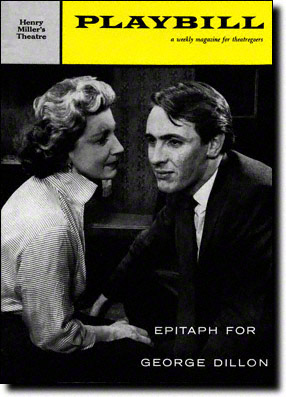Anthony Creighton (1922 - March 22, 2005)

Anthony Creighton (1922, Swanage - 22 March 2005), a British actor and writer, is best known as the co-author of the play Epitaph for George Dillon with John Osborne.
He served in the RAF during the war as a navigator on bomber aircraft. He was awarded the DFC for gallantry for saving the crew of his Halifax bomber over Hamburg. During the war he met Terence Rattigan who was then a wireless operator and air gunner. They appeared together in entertainment for fellow servicemen at RAF ground stations. After the war he completed a course at RADA and subsequently joined a company at Barnstaple in Devon. Shortly afterward he formed his own travelling company, the Sage Repertory Group, with £200 given to him by his mother and was joined by three other actors from Barnstaple. An advertisement in The Stage in 1949 offering actors no salary but a share of the profits was answered by John Osborne who joined the company in Ilfracombe. His company took their plays from village to village but enjoyed little success, they presented a summer residency at the Victoria Theatre on Hayling Island but this too was short-lived. Shortly after he collaborated on two plays with Osborne, the first Personal Enemy fell foul of the censors at the time, the second was An Epitaph for George Dillon.
Although Creighton had little other dramatic success, he remained a close friend and confidant of Osborne, and was living with him on a houseboat in the Thames in 1954, the year Osborne wrote Look Back in Anger. Creighton is believed to have been the model for Cliff in the play.
The friendship between Osborne and Creighton faded over time. In 1960 Creighton co-wrote another play with his American lover Bernard Miller, Tomorrow with Pictures which was produced at the Lyric Hammersmith in 1961. It achieved little success and was to be Creighton's last produced play. Subsequently he taught drama at various London education establishments.
He met Osborne on one last occasion in 1994, at Osborne's country home, to discuss George Dillon royalty payments. Osborne was by then diagnosed as diabetic and a near shadow of his former self, he died shortly after the meeting. Creighton said of the melancholy visit that he would prefer to remember the impecuniously happier times of the 1950s, "I look back on Osborne with love".
In recent years, Creighton has attracted controversy for a different reasons. After Osborne's death in 1994, Creighton claimed in an interview with the critic Nicholas de Jongh that he and Osborne had lived together as lovers. Osborne's surviving family were quick to refute any suggestion of homosexuality on Osborne's part. Creighton finally admitted in an interview with Osborne's biographer, John Heilpern, that he had lied to de Jongh and no homosexual relationship had ever existed. Creighton's proximity to the Angry Young Men of the 1950s and 1960s make his extensive collection of letters and diaries of considerable historical importance.
Source: http://en.wikipedia.org/wiki/Anthony_Creighton
Further Readings:

Almost a Gentleman: An Autobiography : 1955-1966 by John Osborne
Paperback: 304 pages
Publisher: Faber & Faber (March 1994)
Language: English
ISBN-10: 0571166350
ISBN-13: 978-0571166350
Amazon: Almost a Gentleman: An Autobiography : 1955-1966
Following on from Osborne's first autobiographical book, "A Better Class of Person", this book looks at the period 1955 to 1966. It covers the foundation of the English Stage Company at the Royal Court Theatre to the death of his artistic director and Osborne's mentor, George Devine. At the Royal Court he experienced years of high theatrical achievement and low backstage comedy. For the playwright it was a decade of baffling and often ludicrous notoriety and of emotional and matrimonial upheaval. During this period Osborne wrote "The Entertainer", "Luther", "A Portrait for Me" and "Inadmissible Evidence", was propositioned by Marlene Dietrich, spent the night in a Mexican brothel, consoled Vivien Leigh, grappled with the Lord Chamberlain in St James's Palace and won an Oscar.
More LGBT History at my website: www.elisarolle.com/, My Ramblings/Gay Classics
This journal is friends only. This entry was originally posted at http://reviews-and-ramblings.dreamwidth.org/3513144.html. If you are not friends on this journal, Please comment there using OpenID.